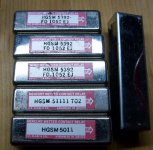dived into my parts bin and found something. I don't know, if the large relay is a mercury wetted one too. Those beauties will go for the best offer. Paypal accepted. Please contact me per pm.
Regards
Regards
Attachments
Last edited:
Nice components those! I was given a box of of them (NO, THEY ARE NOT UP FOR GRABS SO PLEASE NOBODY START BEGGING) that I'm saving for my 'big' amplifier build.
I'd be very interested to know how much you sell them for, just so I know the value of what I was given.
I'd be very interested to know how much you sell them for, just so I know the value of what I was given.
Maybe you need to enlighten people as to their great low level signal switching properties. They only don't want them because they don't yet know that they want them!
Your post had educated me - I didn't know that they need to be mounted with one end up.
Your post had educated me - I didn't know that they need to be mounted with one end up.
There could be two reasons for the lacking mass orders.
a) Since some years it's 'hip' to reject mercury.
b) They are old and mercury does vaporize in normal room conditions. Slowly, but it does. Are you sure that the construction is so perfectly sealed that the contacts are still Hg-wetted after ...- after how many years?
a) Since some years it's 'hip' to reject mercury.
b) They are old and mercury does vaporize in normal room conditions. Slowly, but it does. Are you sure that the construction is so perfectly sealed that the contacts are still Hg-wetted after ...- after how many years?
regarding b)...do you have any evidence for these things happen to such high grade parts or do you just spreading FUD?
Remember, mercury wetted relays were not manufactured for consumer dirt.
Regards
Remember, mercury wetted relays were not manufactured for consumer dirt.
Regards
b) They are old and mercury does vaporize in normal room conditions. Slowly, but it does. Are you sure that the construction is so perfectly sealed that the contacts are still Hg-wetted after ...- after how many years?
Unless they've been dropped and the glass envelopes cracked, there is no way for the mercury to evaporate. The mercury is sealed in completely airtight glass, much like a vacuum tube.
I see these things are still made & sold, but at $40 each, they are not going to be everybody's first choice for an audio switch (that's $80 for a stereo switch, multiply that by the number of inputs you want and it's an expensive pre-amp).
Since I have them already, I think it will be an interesting experiment in going totally overboard!
Also high grade components are designed for a certain life time. That's why I am asking for the age.
If they are designed like reed relays with a perfectly sealed glas tube, then I could easily imagine that they are not degrading even after decades.
You could offer a technical course with detailed informations about these relays. Many people here are technical enthusiasts and might start to become interested in these parts.
If they are designed like reed relays with a perfectly sealed glas tube, then I could easily imagine that they are not degrading even after decades.
You could offer a technical course with detailed informations about these relays. Many people here are technical enthusiasts and might start to become interested in these parts.
Unless they've been dropped and the glass envelopes cracked, there is no way for the mercury to evaporate. The mercury is sealed in completely airtight glass, much like a vacuum tube.
...seeing this after sending my last post...
If this construction is ensured, I would expect extremly long life time.
Furtheron I would guess a low risk.
May be comparable to the low risk of a fluorescent tube?
Member
Joined 2002
i used to have about 3 thousand of these, dad gave them to me from his work, they used them in telephone equipment because there was no noise when switching, however they were big bulky and meh!
I could be interested, however I would like to know the coil resistance and voltage on and dropout voltage. Or a link to a datasheet if you can find one.
Its very hard to damage this type of relay and they last almost forever. The biggest challenge is to mount them as per the arrow. That makes them a hard retrofit.
Its very hard to damage this type of relay and they last almost forever. The biggest challenge is to mount them as per the arrow. That makes them a hard retrofit.
No, I haven't found datasheets. I'm a little busy at the moment and will do the measurements tomorrow
regards
regards
3x Clare HGSM 5392
Rc=430Ohm
Von=4.6V
Voff=1.9V
Clare HGSM5011
Rc=910Ohm
Von=7.6V
Voff=3.4V
Clare HGSM 51111
Rc=3.6kOhm
Von=8.3V
Voff=4V
Regards
Rc=430Ohm
Von=4.6V
Voff=1.9V
Clare HGSM5011
Rc=910Ohm
Von=7.6V
Voff=3.4V
Clare HGSM 51111
Rc=3.6kOhm
Von=8.3V
Voff=4V
Regards
- Status
- Not open for further replies.
